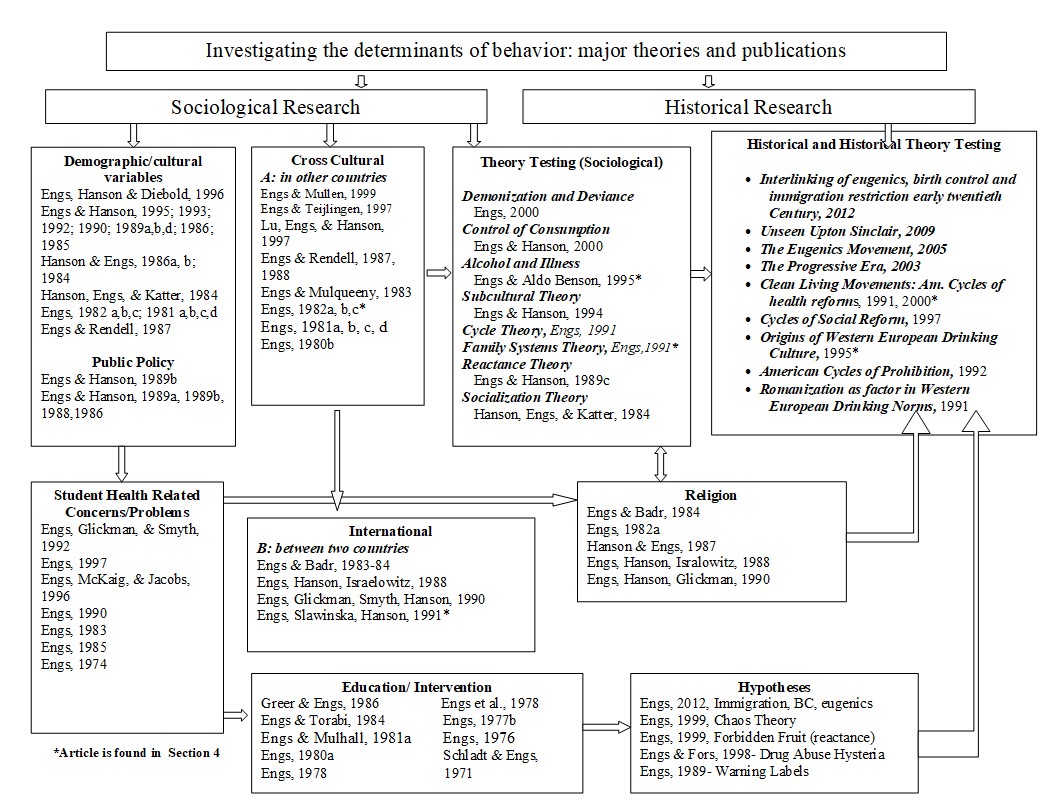Stalking the Determinants of Behavior:
From Boozing Student to Clean Living Movements and Chaos Theory A Research Model to Explain Social Reform Movements
Engs, Ruth Clifford. Ruth. "Stalking the Determinants of Behavior: From Boozing Student to Clean Living Movements," Presented HPER (now SPH) Research Lecture Series. September 24, 1999.
Engs, Ruth Clifford. "Stalking the Determinants of Behavior: From Boozing Student to Chaos Theory," Presented HPER (now SPH). 2002 Distinguished HPER Researcher Award, IU Lecture, 2002.
Complete presentation found on IUScholarWorks Repository: http://hdl.handle.net/2022/26432
Abstract
Engs' sums up her career as a researcher in a model she developed concerning determinants of behavior, in other words what causes people to behave in certain way regarding personal and public health issues. This inquiry has included both quantitative and qualitative historical studies. The model was updated in 2012 to include new research findings.
Her working conclusions from over 40 years of research are that behavior determinants related to drinking and other health related issues in North America have deep roots in western cultures. In the United States clashes of cultural norms—including religious beliefs—brought by immigrants in the 19th and early 20th century led to divergent attitudes and behaviors regarding alcohol consumption and other public health issues over the 20th into the 21st century. A confounding factor is the philosophy of the "rights of society for the common good" in protecting the public health of the nation versus the "right of the individual." These cultural clashes are sometimes not obvious such as found in anti-alcohol cycles and subsequent public policies.
Underlying differences—based upon religious belief systems, faith in non-factual information, family and environmental influences, and cultural norms—have resulted in some health promotion and public health measures to be at best temporary an unable to successfully address the issue. Unwelcomed policies such as Prohibition in the 1920s and abusive alcohol consumption among under 21-year college students resulted in a backlash against the policies. These health measures were often fostered by "Clean Living Cycles" that are associated with a spiritual awakening and efforts to "Clean up America and bring it back to a perceived golden age." Chaos theory as an underlying origin of these cycles is also proposed. These theories and model have implications for resistance against public health measures, such as animosity against immunizations, social distancing and mask wearing, during the 2020-2021 Covid-19 pandemic.
Two presentations using PowerPoint slides that include the outline, and basic information from the lectures are detailed. "From Boozing Student to Clean Living Movements" and "From Boozing Student to Chaos Theory, using much of the same material with the addition of chaos theory, were presented in 1999 and 2002 at what is now the School of Public Health, Indiana University Bloomington.


